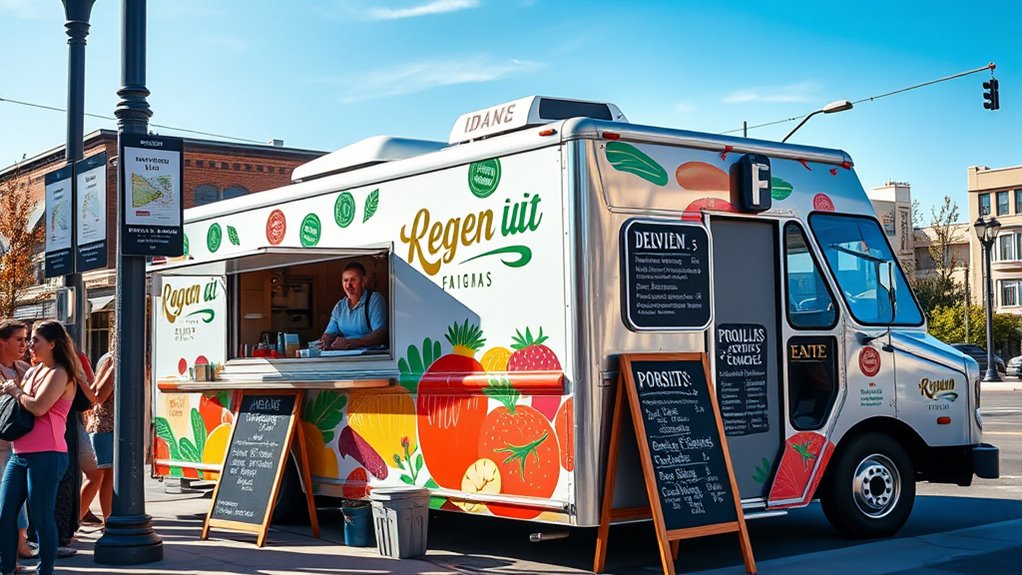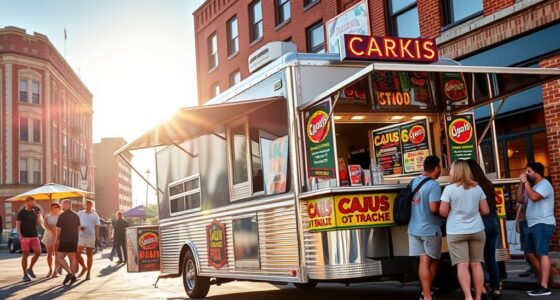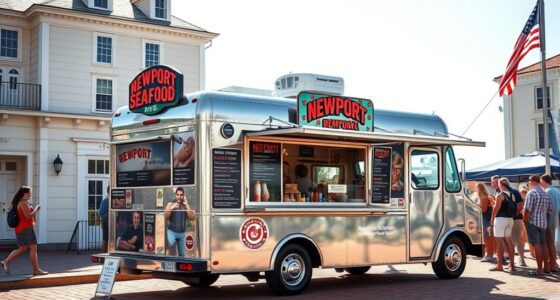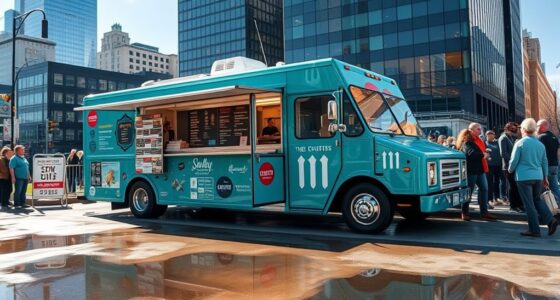To open a food truck in Boise, Idaho, you’ll need to secure a Mobile Food Establishment License from Central District Health and a general business license, budgeting around $180 to $200 for fees. Choose approved public spaces like parks or event areas and verify your menu follows Idaho Food Code standards with local ingredients. Focus on marketing through social media and community events. To guarantee everything runs smoothly, you’ll want to understand zoning, health, and safety requirements—learn more to get started confidently.
Key Takeaways
- Obtain a Mobile Food Establishment License from Central District Health at least 30 days before opening, including plans and a commissary agreement.
- Startup costs range from $10,000 to over $100,000, with menu planning focusing on 10-15 diverse, locally-sourced dishes.
- Operate in permitted public spaces like parks, festivals, or private property with owner permission, adhering to zoning and distance regulations.
- Use social media and participate in community events to boost visibility, with loyalty programs increasing repeat customers.
- Maintain strict food safety standards, proper equipment, sanitation, and safety inspections to ensure compliance and customer satisfaction.
Navigating Licensing and Permits in Boise
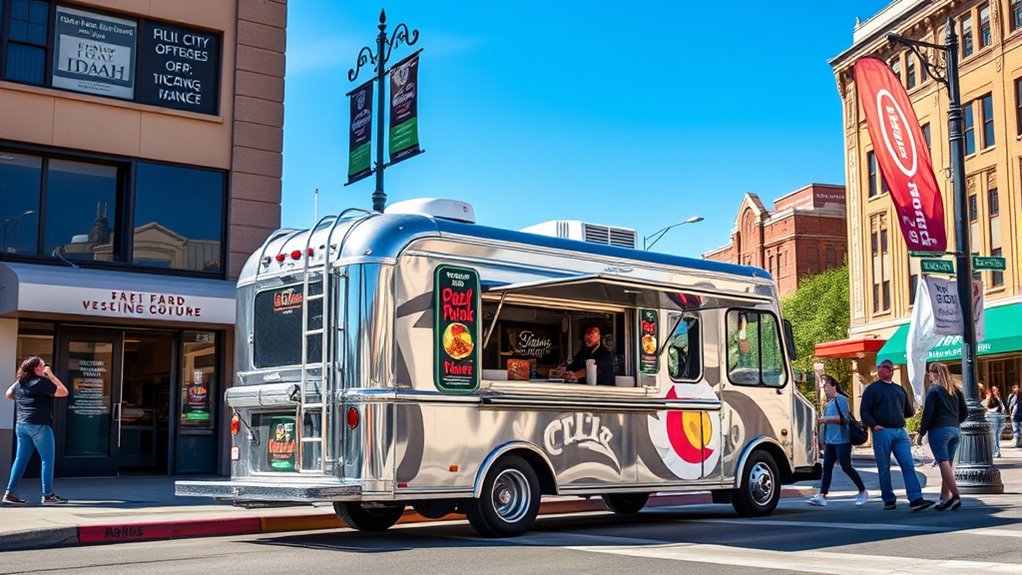
Managing licensing and permits in Boise is an essential step for any food truck owner, as it guarantees your business complies with local health, safety, and zoning regulations. First, you need to submit a Mobile Food Establishment License application to Central District Health at least 30 days before opening. Attach your floor plan and menu, and verify you sign a commissary agreement if using a shared kitchen. Pay fees ranging from $80 to $100 plus a $100 review fee. You must pass a pre-operational health inspection at least two weeks before opening. Additionally, obtain a general business license from Boise or Ada County, and confirm any extra registration requirements for mobile vendors. Keep all licenses visible on your truck during operation to stay compliant with city rules. Check local regulations regularly to ensure ongoing compliance with any new or updated requirements. Incorporating Glycolic Acid into your skincare routine can help maintain healthy skin as you prepare for your business launch.
Estimating Startup Expenses for Your Food Truck
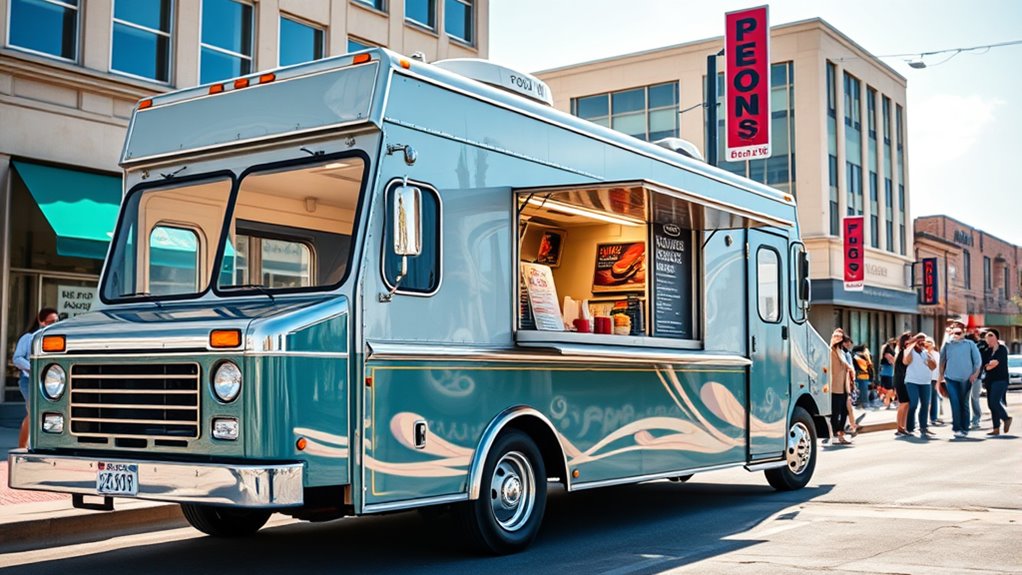
Estimating startup expenses for your food truck helps you plan financially and avoid surprises as you launch your business. The initial purchase of a truck in Idaho can range from $10,000 for basic used models to over $250,000 for new, customized trucks. A well-equipped used truck typically costs between $35,000 and $60,000. Customization, including kitchen equipment, shelving, utilities, and branding, adds to costs, with new trucks exceeding $100,000. You’ll also need to budget for inventory, which can run $2,000 to $3,000, plus serveware and utensils. Don’t forget licensing fees, usually around $80 to $100, and permit review costs. Additionally, plan for insurance, labor, marketing, and ongoing operational expenses to ensure your startup budget is thorough and realistic. Careful planning can help you allocate funds effectively and prevent unexpected expenses from derailing your business launch. Understanding the track development process in trailer music can provide insights into structuring your marketing narrative effectively.
Choosing the Right Locations and Zoning Compliance
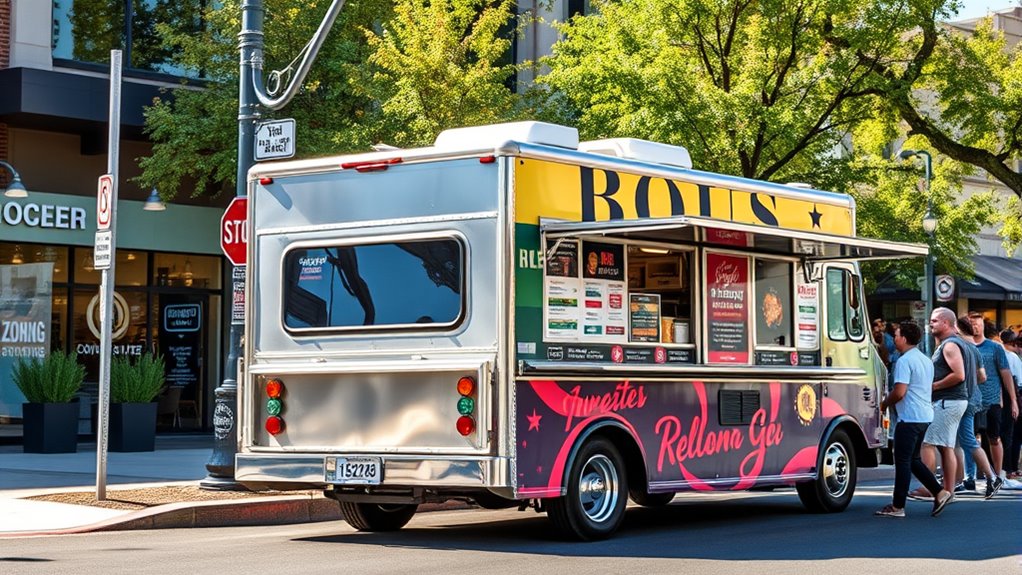
Choosing the right locations for your food truck means understanding Boise’s zoning regulations and where you’re allowed to operate. You should focus on permitted public spaces that meet fire safety standards and avoid restrictions like minimum distances from other vendors or city fixtures. By planning strategically, you can guarantee compliance and maximize your sales potential in the best spots. Temporary uses, including food trucks, are subject to specific location standards that must be adhered to for legal operation. Additionally, being aware of zoning compliance helps ensure your food truck operates smoothly without unexpected legal issues.
Local Zoning Regulations
Are you aware of Boise’s specific zoning rules that determine where food trucks can operate? Boise divides vending into zones with distinct regulations. Downtown areas have stricter rules, limited permits, and designated vending spots. Residential zones generally prohibit mobile vending, except for ice cream trucks with special permits during limited hours. Vending on private property requires owner permission and compliance with zone rules, often needing a temporary use permit. Certain commercial and retail zones impose distance restrictions from other vendors, schools, and brick-and-mortar businesses. These regulations are crucial for ensuring zoning compliance and successful operation of your food truck.
Permitted Public Spaces
To operate legally and successfully, food trucks need to select public spaces that align with Boise’s zoning rules and designated vending areas. Boise offers specific spots like Green Acres Food Truck Park, where trucks can serve daily, and other parks with vending permissions, such as paved areas within city parks. These spaces provide a consistent, permitted environment, helping you avoid illegal placement issues. Imagine:
- Being at a vibrant food truck hub near parks, drawing crowds for daily service
- Serving from paved park roads with proper permits, avoiding restrictions
- Steering park reservation requirements for alcohol or special events
- Maintaining safe distances from street hardware and respecting operational hours
Choosing these designated areas ensures compliance, community support, and a smooth operation, making your food truck venture more successful. Proper permitting and adherence to local regulations are essential for a hassle-free experience and building a positive reputation within the Boise community. Additionally, understanding zoning compliance can help prevent violations and ensure your truck operates within legal boundaries.
Strategic Placement Tips
Strategic placement of your food truck is key to attracting customers and staying compliant with Boise’s zoning laws. Focus on high pedestrian areas like business districts, parks, and event venues, ensuring you’re in approved commercial zones for mobile vending. Visibility from main roads and sidewalks is essential, but avoid obstructing fire lanes or emergency access. Maintain at least a 50-foot distance from other vendors to comply with city spacing rules. Verify short-term permits, typically valid up to 7 days, and ensure your location meets setback requirements—like staying 15 feet from public rights-of-way. Choose sites near complementary businesses to boost sales and leverage city events or festivals for exposure. Always keep your truck mobile, self-sufficient, and in line with Boise’s zoning and safety regulations. Locations & Operating Restrictions Vendors must adhere to specific placement and operational guidelines, including restrictions on vending in congested areas or near certain public features. Incorporating zoning compliance strategies ensures your food truck remains within legal boundaries while maximizing customer reach.
Developing a Compliant and Appealing Menu
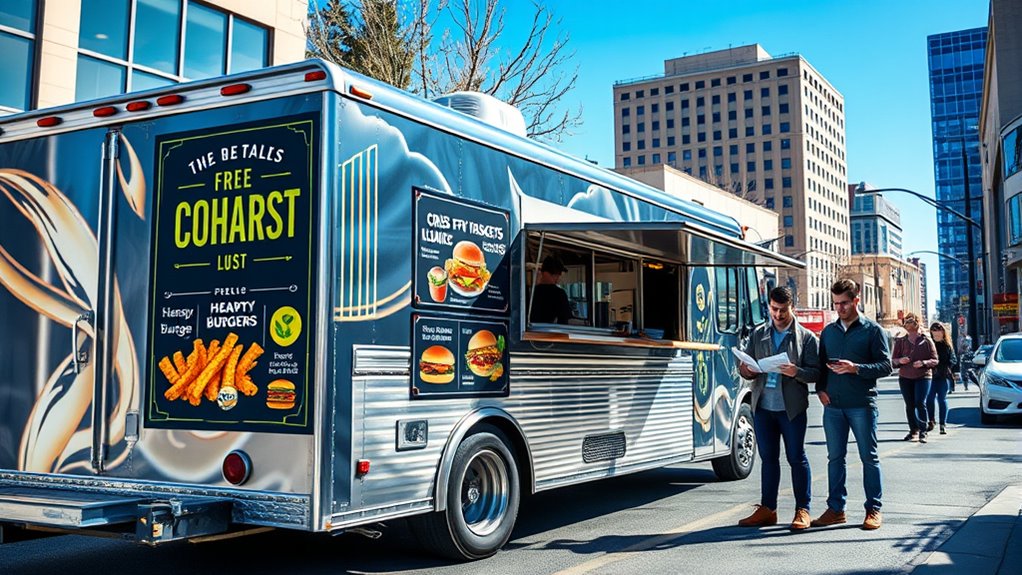
To create a menu that’s both compliant and appealing, you need to follow Idaho’s food safety standards, ensuring all ingredients come from approved sources and are prepared in licensed facilities. Balancing menu variety with local ingredients helps attract a wider audience while keeping operations manageable. Focusing on safe handling practices and sourcing from trusted suppliers keeps your food truck compliant and your customers satisfied. Incorporating fresh, local produce can also enhance menu appeal and support community connections.
Food Safety Standards
Developing a compliant and appealing menu for your Boise food truck starts with understanding and adhering to food safety standards. You must follow Idaho Food Code and secure the necessary licensing, including submitting plans, applications, and commissary agreements. Food preparation and dishwashing are only allowed in approved commissaries or the truck itself—home kitchens are off-limits. Ensure your food storage involves approved sources, proper labeling, and correct temperature controls to prevent contamination. Regularly monitor and record storage temperatures for TCS foods. Keep utensils, equipment, and surfaces sanitized using approved methods and disinfectants. Install and maintain fire safety equipment, including hood systems, extinguishers, and gas alarms, to meet Boise fire regulations. Adhering to these safety standards helps prevent violations and ensures customer trust. Additionally, maintaining proper food handling procedures is essential for regulatory compliance and customer safety.
Menu Variety Balance
Creating a balanced and appealing menu for your Boise food truck involves carefully selecting a variety of items that attract diverse customers while comply with food safety standards. Focus on offering a mix of protein, vegetarian, and vegan options to broaden your appeal. Include items with different flavor profiles—spicy, mild, sweet—to satisfy varied tastes. Limit your menu to 10-15 carefully curated dishes to maintain quality and efficient operations. Incorporate signature dishes that reflect Boise’s local culture and seasonal or limited-time offerings to keep customers interested. Prioritize ingredients that share common components to reduce waste. Guarantee all menu items are prepared using approved sources and adhere to Idaho’s food regulations, including allergen labeling and proper storage. Balance simplicity with complexity for quick service and consistent quality. Additionally, understanding tire size considerations can help optimize food truck stability and performance on various terrains.
Local Ingredient Sourcing
Leveraging local ingredients can elevate your Boise food truck’s menu by showcasing fresh, regional flavors that resonate with customers. You’ll want to build relationships with nearby farmers markets like Boise Farmers Market and Capital City Public Market to access seasonal produce. Idaho’s abundant potatoes, wheat, dairy, and specialty crops provide versatile options for your dishes. Partnering with regional cooperatives or directly sourcing from farmers reduces costs and boosts freshness. Keep in mind, sourcing local seafood might be limited, so consider Pacific Northwest suppliers for certain items. To stay compliant, make certain proper handling and labeling of all ingredients per Idaho Food Code. Incorporating these local elements into your menu, highlighting seasonality and regional specialties, can enhance your branding and appeal to Boise’s community. Additionally, selecting ingredients with high-quality standards ensures your offerings meet safety and customer satisfaction expectations.
Effective Marketing Strategies to Build Your Customer Base
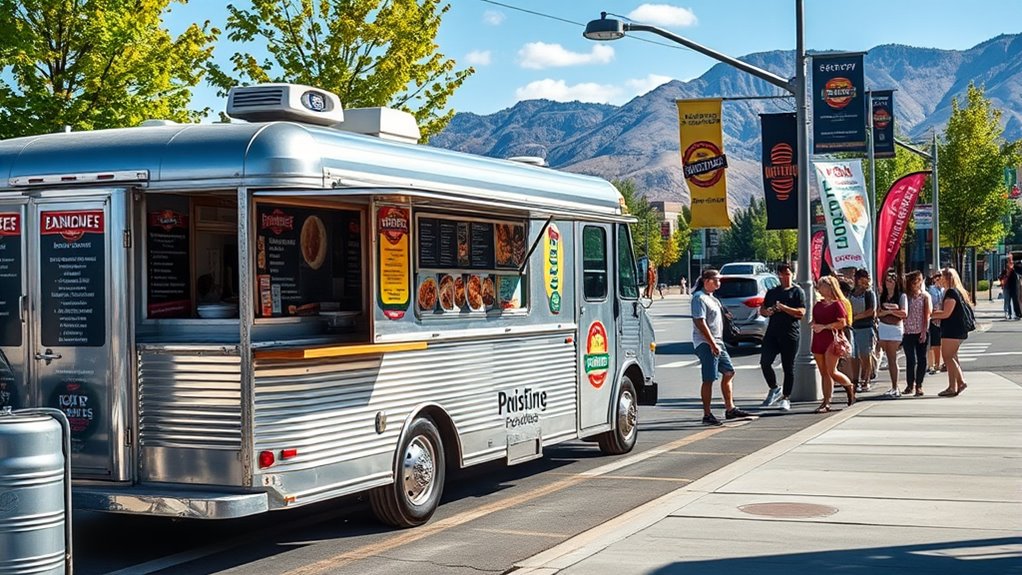
To effectively build your customer base, you need to implement targeted marketing strategies that reach your ideal audience and keep them engaged. Leverage social media platforms like Facebook, which 75% of food trucks use to boost visibility and sales—social campaigns can increase sales by about 20% and encourage customers to spend 15% more. Participate in at least three festivals or community events annually to enhance brand recognition and attract foot traffic. Develop loyalty programs that boost repeat visits by 30%, and use email marketing to nurture customer relationships. Focus on Millennials and Gen Z by highlighting sustainability and offering trendy, healthy menu options, and use data analytics and mobile apps to optimize location targeting and customer engagement. Combining online efforts with community presence creates a strong, loyal customer base for your Boise food truck. Over 24,000 food trucks operate in the United States as of 2023, demonstrating the competitive landscape and the importance of strategic marketing to stand out.
Ensuring Health and Safety Standards for Successful Operations
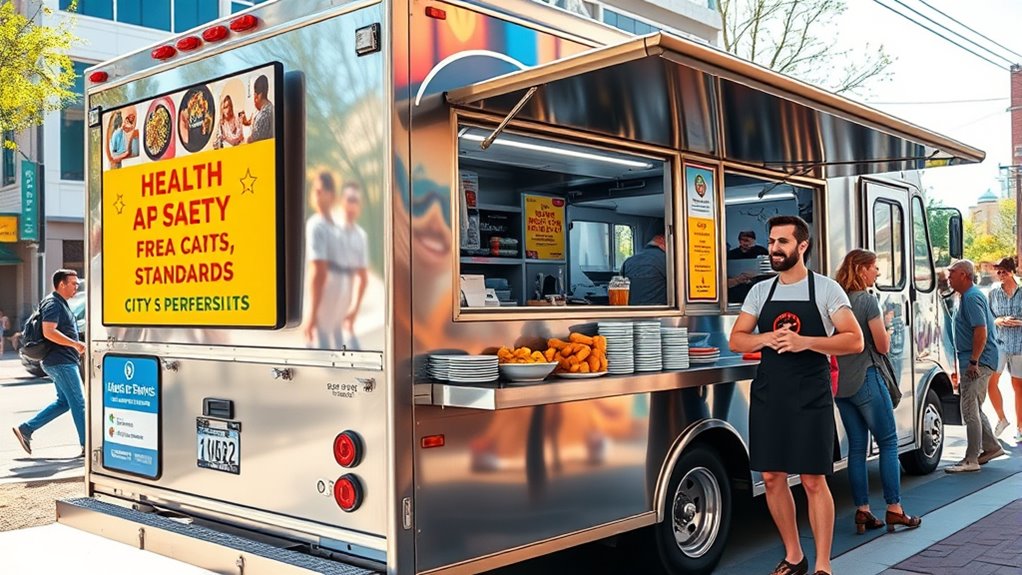
Ensuring health and safety standards is essential for your food truck’s success in Boise. You must meet equipment requirements like mechanical refrigeration, onboard water heaters, hand wash sinks, and a 3-compartment sink for cleaning. Employees with symptoms of illness—such as nausea, vomiting, diarrhea, or fever—are barred from handling food. Maintain proper sanitation, exclude sick workers, and follow Idaho Food Safety standards.
Prioritize health and safety by maintaining proper sanitation, excluding ill staff, and meeting Idaho food safety and equipment standards.
- Install LP gas alarms or combustible gas detectors to prevent leaks
- Service fire extinguishers annually and hood systems biannually
- Undergo biannual or monthly inspections of grease hoods and cooking appliances
- Pass fire department inspections before operation
Adhering to these protocols keeps your truck compliant, safe, and ready to serve.
Frequently Asked Questions
How Long Does the Entire Permit Approval Process Typically Take in Boise?
You’re probably wondering how long the permit approval takes in Boise. Typically, it takes about 2-3 weeks for standard permits, but it can be longer if applications are incomplete or during busy seasons. Allow at least 30 days to prepare everything, including inspections and approvals from multiple departments. Missing documents or delays in health or fire inspections can extend the process, so plan ahead to avoid setbacks.
Are There Restrictions on Operating Food Trucks During Special Events or Festivals?
Like steering a maze with Minotaur, operating your food truck during events requires careful steps. You must comply with all health, fire, and city permits specific to the festival. Restrictions on location, hours, and setup size are common, and extra permits or inspections might be necessary. Event organizers verify your compliance, so guarantee all licenses and safety standards are in place to avoid stumbling at the finish line.
Can I Sell Alcohol From My Food Truck in Boise?
You can’t sell alcohol directly from your Boise food truck. Idaho restricts alcohol licenses to permanent establishments like bars and restaurants, and trucks don’t meet the requirements for a standard license. However, you can serve alcohol at special events with a catering permit, which must be obtained beforehand. Keep in mind, these permits are for specific occasions and don’t allow routine alcohol sales from your truck.
What Are the Insurance Requirements for Food Truck Operations in Boise?
You need to guarantee your Boise food truck meets specific insurance requirements. You must have commercial auto insurance with at least $25,000 per person and $50,000 per accident liability coverage. While general liability and product liability aren’t mandated statewide, many events require proof of these. Consider adding coverage for equipment, property, and potential food-related claims. Shopping around with providers familiar with Boise’s regulations can help you find the best coverage options.
Are There Specific Noise or Signage Regulations for Food Trucks in Boise?
Sound and signage standards shape your food truck’s success in Boise. You must mind the magnified noise, especially near neighborhoods, restricting loud amplification and limiting hours from 6 a.m. to 10 p.m. Signage should be safe, strategic, and unobstructive, with no oversized or obstructive displays, and proper permits. Keep clear pathways, respect spacing, and stay compliant with city codes to avoid penalties and promote a positive, problem-free presence.
Conclusion
Starting your food truck in Boise may seem like a mountain to climb, but with the right permits, planning, and passion, you can turn that mountain into a stepping stone. Remember, every great journey begins with a single step—so take it confidently. Keep your focus on compliance, quality, and community, and you’ll turn your food truck dreams into a thriving reality. The road to success is paved with preparation—are you ready to roll?
